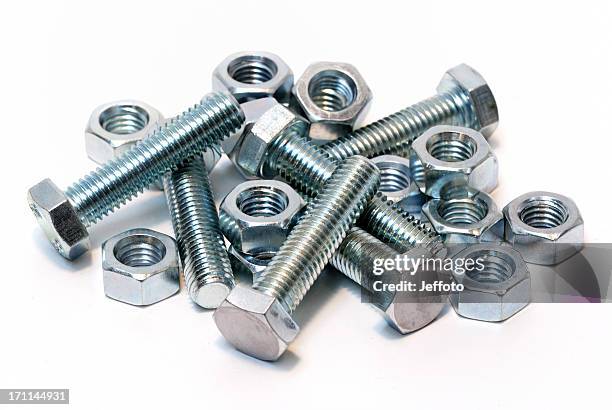In the realm of do-it-yourself endeavors, nuts and bolts are vital that often goes unnoticed but is critical in ensuring the robustness of any creation. Regardless if you are creating an innovative shelving unit, crafting home decor, or engaging in a substantial building task, understanding the various kinds of nuts and bolts can greatly influence the results. This piece acts as an all-encompassing resource to help you sort through the countless choices at hand, ensuring that you choose the right fasteners to meet your unique requirements.
From hex bolts to flat head bolts, and regular nuts to unique varieties, the range can seem daunting. All kinds have specific applications and performance characteristics that qualify it for different materials and situations. By examining the fundamentals of nuts and bolts, investigating their functionalities, and looking into the different materials and finishes on offer, we intend to provide you with the information needed to select the perfect fastener on your upcoming DIY project. Therefore, whether you are an expert in DIY or a beginner, prepare to improve your skills and self-assurance in safely securing projects.
Variations of Fasteners and Bolts
When starting a DIY project, knowing the multiple kinds of fasteners and screws is important for picking the appropriate fasteners for the job. Bolts are typically classified by their style and purpose, with popular types including hex bolts, carriage bolts, and lag bolts. Hex bolts are preferred for their versatility and strength, while carriage screws are perfect for uses requiring a smooth appearance and simple installation. Lag screws, on the contrary, are specifically designed for heavy-duty fastening in wood due to their large, coarse spirals.
Fasteners serve as the complement to bolts, offering a secure fastening system. There are many types of nuts, with hex nuts being the most common in combination with regular screws. Other options include lock nuts, which include a design that prevents becoming loose due to vibration, and flange nuts, which have a integrated disc for better load distribution. Choosing Head Screws is important, as it needs to align both the size of the screw and the requirements of the task.
In supplement to standard nuts and screws, unique fasteners are provided for specific applications. For illustration, nylon fasteners offer added security by halting movement, while expansion bolts are beneficial in masonry work where increased holding strength is essential. Grasping these differences and their uses will enhance your DIY efforts, guaranteeing that your tasks are safe and durable.
Materials and Coatings
When selecting nuts and bolts for your endeavor, the substance is crucial for guaranteeing longevity and suitability for your specific needs. Steel is the most common material utilized, recognized for its durability and versatility. It comes in various types, which vary in load-bearing capacity and corrosion resistance. Stainless steel, on the other hand, offers excellent resistance to oxidation and corrosion, making it perfect for outdoor applications and environments where moisture is a concern. Other materials like brass and titanium are also options, each providing distinct benefits: brass is often employed for its aesthetic appeal and resistance to oxidation, while titanium is preferred in specific uses due to its light and remarkably high strength-to-weight ratio.
Finishes also play a important role in the performance of fasteners and screws. Different coatings can enhance corrosion resistance, which is crucial for fasteners exposed to the environment. Zinc plating is a popular option, providing a protective layer that stops rust and corrosion. Galvanization, which involves a thicker layer of zinc metal, offers even enhanced protection for heavy-duty applications. Additionally, unique coatings such as dark oxide and ceramic coatings can enhance both appearance and resistance against degradation. Understanding these coatings can assist you select the right hardware for your setting and the longevity of your endeavor.
Finally, it is critical to consider how the selected materials and coatings interact with one another. For instance, using dissimilar metals can occasionally lead to galvanic corrosion, especially in external settings. Therefore, making sure compatibility between fasteners, screws, and the materials they will be attached to is crucial. This understanding will not only enhance the performance of your hardware but also ensure the success and safety of your DIY projects.
Guides for Purchasing and Comparisons
As you choosing fasteners for your project, it's crucial to comprehend the distinctions between metric and imperial fasteners. Metric fasteners, which are gauged in millimeters, give greater precision yet may not necessarily be suitable with tools designed for imperial measurements, that are based on inches. Knowing what system your project requires can help you avoid time and frustration. Always check the specifications of the components you are working with to ensure a perfect fit.
Measuring nuts and bolts correctly is crucial to ensure that you purchase the correct size. Utilize calipers for precision and refer to sizing charts that correspond to threading standards. Standard measurements include width, length, and thread pitch, which can greatly affect the functionality of the fasteners in your project. Taking these measurements accurately can help avoid costly mistakes and ensure that your assembly holds strong.
When search for quality fasteners, consider durability, material, and coating. High-grade steel, stainless steel, and corrosion-resistant coatings like zinc plating or galvanization can significantly extend the life of your nuts and bolts, particularly in harsh environments. Consistently look for reputable brands and check out reviews to gauge the reliability of the fasteners you intend to purchase. A thoughtful choice will enhance the safety and longevity of your DIY projects.

